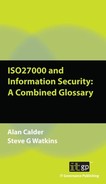M
MAC – see Media Access Control.
MAC filtering – access permission configuration based on the MAC address of specific network cards.
Mbps – ‘megabits per second’ is a measure for digital data transfer rates and a megabit in the context of data storage is one million bits.
Macro – a script of actions to automate repetitive tasks.
Macro virus – is a virus that spreads through the macro-scripting language used in Microsoft Office applications.
Mail bomb – large amount of e-mail data sent to an address to crash the user’s e-mail programme or prevent receipt of further messages.
Mail relaying – attackers use other systems’ e-mail servers to send e-mail messages.
Mail server – the server that provides central support for mail clients.
Malware – is any form of ‘malicious stuff’ that tries to clog up your computer. It includes adware, spam, spim, spyware, viruses, worms, Trojans and automated exploits, using e-mail attachments, instant messaging, unprotected Internet connections and browsers. See Scumware.
Management system – this is a framework of policies, procedures, guidelines, and associated resources, to achieve the objectives of the organisation.
‘Man in the middle’ – a hacker places himself undetected between two parties to an Internet transaction, whether on a LAN, an unsecured Internet link, a WLAN, or on a cellular telephone network. The hacker intercepts and reads messages between the two parties and can alter them without the intended recipient knowing what has happened. This is often recognised as a form of masquerading; see also Evil twin.
Manual of Protective Security – this was the primary source of protective security advice and guidance for the UK public sector. It was replaced by the SPF in 2009.
Masquerading – a hacker will pretend to be a legitimate user, trying to access legitimate information, using a password or PIN that was easily obtained or copied, and will then try to access more confidential information or execute commands that are not usually publicly accessible. See also Evil twin.
MasterCode SecureCode – see 3-D Secure.
Media Access Control – every WiFi device has a unique MAC number allocated by its manufacturer. A wireless AP can be programmed to accept only certain MAC addresses and to block all others. While this is relatively simple for a SoHo network (Small Office, Home office), it can be time-consuming to set up and maintain in a large corporate network. It is also possible for a hacker to spoof a MAC address.
Mega byte – 1,024 kilobytes.
Memory stick – a portable memory device, designed to access a computer through a USB port.
Microsoft – A software company best known for the Windows operating system. Their products include NT4, Win 2000, Office, Explorer, Windows XP, Windows 2007, Server2008, SharePoint, etc.
MIME – Multipurpose Internet Mail Extensions is a specification that provides a standard method for attaching to basic e-mail messages additional files such as pictures, audio and application files.
MIMO – Multiple-input, Multiple-output.
Mobile code – programs that are sent in one version only to a heterogeneous collection of processors and are executed with the same semantic on each of those processors without explicit installation or execution by the recipient. *
Mobile phones – surely everyone knows what these are?
Mobile worker – this is someone who doesn’t work from a fixed geographic location and whose job requires them to spend a substantial amount of time out of the office, ‘on the road’, or travelling. Mobile workers use laptops (increasingly connecting through wireless HotSpots), mobile phones and PDAs to keep in touch with their offices and homes.
Modem – a modulator/de-modulator is a device that enables a computer to transmit data over analogue telephone lines.
MP3 – MPEG Audio Layer-3 is the standard for compressing and storing files, typically music.
MPEG – Moving Pictures Experts Group is a standard for digital video and audio compression.
MPS – see Manual of Protective Security.
MSN Messenger – is Microsoft’s Instant Messenger service.
MSP – in this context, not a Member of the Scottish Parliament, but a Managed Service Provider, an organisation that is providing support services – which might include management of infrastructure, patching, networks, PCs, etc. for its clients from a remote location. MSP is also the acronym for Managing Successful Programmes, the OGC methodology for doing exactly that. OGC have trademarked the acronym MSP, which could make life a bit confusing for Managed Service Providers.
MSSP – Managed Security Service Provider.
Multiple sign-on – a user within an organisation who is authorised to use multiple applications and services, would have to sign on individually to each one, unless the organisation uses single sign-on software.
